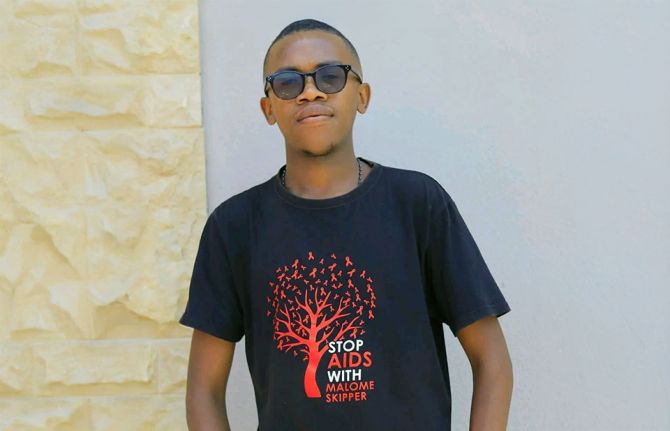
Feature Story
Building knowledge, skills and hope in southern Africa’s schools
07 October 2011
07 October 2011 07 October 2011
Learners participating in a ‘Positive Speaking’ intervention, in Luanda, Angola
Credit: UNESCO
Students and teachers in four southern African countries are benefiting from an ambitious HIV programme spearheaded by UNESCO. From its start in 2008, the programme was designed to strengthen the education sector’s AIDS response in Angola, Lesotho, Namibia and Swaziland.
Called ‘Building knowledge, skills and hope: HIV and AIDS education for African children’, the three-year project has encompassed improving the curriculum and learning materials about HIV. It has also focused on supporting teacher training with better programme and policy guidance. The programme aimed to strengthen care and support systems for learners and education personnel affected by HIV as well as to improve the delivery of AIDS education in hundreds of schools.
Implemented by UNESCO and financed by the Virginio Bruni Tedeschi Foundation, the project was carried out under the UNAIDS Global Initiative on Education and HIV and AIDS (EDUCAIDS) and reinforced ongoing work in each country’s ministry of education.
According to UNESCO the result has been the repositioning of the education sector at the centre of the national AIDS response in all four countries. Reforms are underway in all project countries to integrate HIV and sexuality education into the curricula of schools and teacher training institutions.
The initiative has led to a number of innovations such as the establishment of the first national networks of teachers affected by HIV. “Since this initiative was launched, we share our experiences, our fears, our hopes and our dreams together,” said Nelao Martin, a teacher living with HIV and a member of the EduSector Support Network on Health and HIV in Namibia. “In the past, someone somewhere has necessarily been through the same difficulties and managed to deal with it.”
Since this initiative was launched, we share our experiences, our fears, our hopes and our dreams together. In the past, someone somewhere has necessarily been through the same difficulties and managed to deal with it.
Nelao Martin, a teacher living with HIV and a member of a national network of teachers affected by the virus in Namibia
The first support groups for children and adolescents affected by AIDS have been established. Also, in partnership with associations of people living with HIV, new approaches have been used to reach out to positive learners in schools. ‘Positive Speaking’ sessions were introduced whereby personal testimonies and experiences of young, openly HIV-positive facilitators allowed pupils to ‘put a face’ to the virus.
Nkuebe Peete, an HIV-positive 23 year-old living in Lesotho has taken part in such interventions: “I am proud to share my story and experience with younger people so that they do not make the same mistakes that I made and become supportive to those who live with HIV. This has given a new meaning to my life. I now have the feeling of being a much better person than before.”
In addition, innovative teaching and learning materials have been developed such as the series of speaking books on HIV for primary pupils in Swaziland. Most materials for the sensitization of older students have been developed by the learners themselves in creative and interactive ways. One particular approach involved national and regional ‘PhotoVoice’ exhibitions which highlighted testimonies of HIV-positive learners and teachers. In total, project activities have reached more than 4 000 schools, 17 000 teachers and nearly half a million learners.
Building on the groundwork laid by the project new initiatives are being developed. For example, in May 2011 Namibia’s ministry of education mandated and budgeted for the introduction of full-time teachers dedicated solely to life skills education, guidance and counselling in all primary and secondary schools.
Lesotho and Swaziland are about to adopt policies that recognize the impact of AIDS on their education systems. Such policies call for the integration of strategies for prevention and care adapted to the needs of learners and teachers. Similar efforts have been initiated in Angola, which is addressing the formulation of an education sector strategy and policy on HIV.
Project partners believe the programme has contributed significantly to improving the AIDS response in the education sectors in all four countries. According to Majoele Likonelo Hlasoa, Director of Planning at the Ministry of Education and Training in Lesotho, “When I first joined the Ministry of Education, I did not understand what the education sector could and should do about HIV, which I considered then as a health issue falling fully under the responsibility of the Ministry of Health. Since I have been exposed to the EDUCAIDS framework for action, I have changed my mind and have a real understanding of the issues at stake.”



